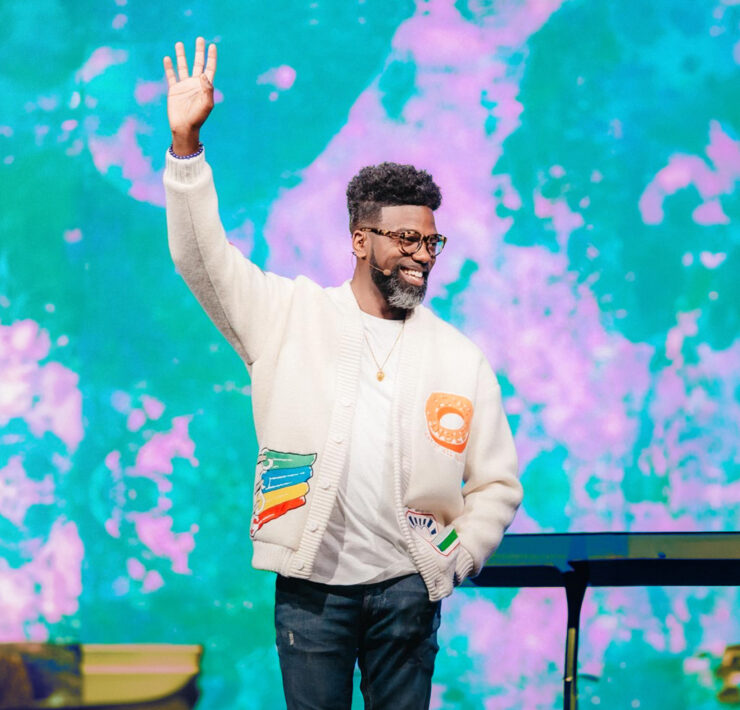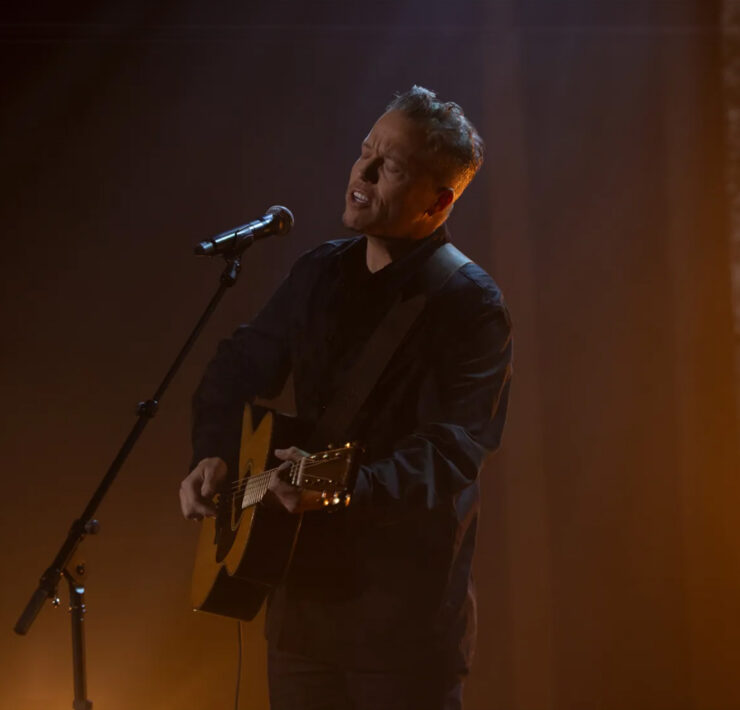In 2020, Kari Costanza was preparing for a trip to Tennessee to celebrate Easter with her dad’s family. It was an eclectic group. One was a judge. Another, a moonshiner. And still another — her cousin — was a doctor. A doctor who told her something that would prove to be prophetic.
“The virus is going to shut down the world,” she recalls hearing. “ No one is going to be traveling at Easter.”
She canceled the plans. “The virus,” as it was called, did indeed shut down the world. That was a particularly big deal for her. She’s the senior communicator for World Vision, an international humanitarian organization. Her job is to travel the world, documenting stories of her organization’s impact — be it in Malawi, Rwanda or Kenya. World Vision relies on her work to keep donors appraised of how their dollars are being spent and what sort of impact they’re having. If she can’t travel, those stories can’t be told. And by March of 2020, it was clear those stories were not going to be told. At least, not in the way Costanza had been used to telling them.
“We were preparing for a World Vision conference in early March 2020 in Dallas, Texas, for 400 donors,” she recalls. “We’d be bringing in staff from Malawi to talk about our programs in water and economic development. In October 2019, our communications team had stayed in tents to document the story of our drilling team in Malawi and put together a video. It was a great story. We’d filmed a nighttime tent scene with one of our water technicians, Liddah, that would make it feel like she was unzipping her tent and emerging from Malawi onto the stage in Dallas. It was going to be so cool.”
But the event went completely online, long before such moves became commonplace in our COVID-era. Costanza had to rethink her whole model of ministry, and she realized that this might not be a one-time thing.
“I started thinking about virtual storytelling and how we could continue to take people to the field to see our work,” she said, via an email interview. “It has been a struggle. People spend so much time on Zoom. Who wants another Zoom call? Virtual storytelling has to be compelling, entertaining and interactive to keep a Zoom-weary audience engaged.”
We have all, in various ways, had to change how we live to meet the challenges of our pandemic era. Some of those changes have been irritating. Some of them have been real sacrifices. And some of them have involved coping with grief, as we watched loved ones succumb to a deadly virus we are still trying to understand.
But for those on the frontlines of international work, the job has had a very different wrinkle. For organizations like World Vision, dealing with disease falls squarely into their line of work. But how do you grapple with a global pandemic? How do you deal with a disruption of this magnitude?
Costanza is just one of countless people who have had to rethink their work at the fundamental level over the last few years. But for many of us, the question has been a little more academic, often boiling down to politics and questions of social identity. For people in justice work, the stakes could not be higher.
A Value Proposition
For many important causes, COVID-19 was something of a value proposition. The early days of the pandemic were particularly thorny. In the U.S., many who had been rigid about following lockdown protocols decided to take to the streets in support of racial justice protests sparked by the police killings of Black citizens like George Floyd and Breonna Taylor.
No COVID-10 outbreaks were tied to the mass demonstrations which took place in the early summer of 2020, before scientists’ clearly understood how much outdoor contact minimized the chances of spreading the virus, but protesters nevertheless made a decision: their support for change outweighed the risks of spreading COVID-19. Justice organizations had to make similar judgment calls.
For many organizations, that meant canceling planned missions. While the U.S. has been fairly hands-off in its approach to mandating COVID-19 guidelines, many other countries have been far stricter. Missions organizations like Score International coordinate with international governments to make sure their missionaries and aid workers are compliant with local mandates or, when necessary, delay their trips.
But not every group is willing to exercise such caution. Evangelical mission group Ethnos360 drew global ire when it defied Brazil’s Indigenous agency FUNAI in an attempt to reach Amazon Indigenous groups in March of 2020 — just as COVID-19 reached the South American nation. Indigenous tribes in the area have a long and fraught relationship with American missionaries. In 1987, a small, isolated tribe in the Amazon known as the Zo’é were contacted by New Tribes Mission Brazil, and promptly found themselves at the mercy of a malaria and influenza outbreak that killed an estimated 45 of them over four years, bringing their total number down to about 133. FUNAI booted New Tribes in 1991, but current Brazilian President Jair Bolsonaro has been more open to American evangelical influence than many of his predecessors.
To put it bluntly, COVID-19 has forced many organizations to ask what they really value more: their stated mission or the wellbeing of the people they serve.
According to Costanza, World Vision has been cautious and deferential to international law. Every trip is evaluated on a case-by-case basis with thorough conversations with local authorities, senior leadership and World Vision staff already in the area. In October of last year, Costanza traveled to Ghana with the clearance of West Africa staff. However, a trip to Kenya to cover local efforts to abolish female genital mutilation was not approved following input from local authorities around government mandates. Instead, World Vision is relying on native communicators in Kenya to cover the campaign.
That sort of cooperation has been key to keeping many international justice organizations afloat. Those with robust networks among the local populace have been able to rely on their on-the-ground work during the pandemic, while others that took more short-term approaches have found themselves stymied by safety concerns and a lack of infrastructure to support remote efforts.
No New Normal
Now, foreign aid workers find themselves in an uncomfortable limbo. The pandemic isn’t over, but the guidelines are shifting along with the rollout of vaccines, an increased scientific understanding of the virus and, of course, new coronavirus variants.
Costanza recently returned from a World Vision trip to Honduras. To travel, she had to submit a proof of vaccination, provide a negative COVID-19 test before traveling and take another test 24 hours before her return flight. It’s an added hassle, to be sure, but she says that it’s helped her feel safer about traveling.
The real stress, she says, has been the facemask. She says she wears a new KN95 mask every day before beginning her interviews with local workers and people who’ve been impacted by them. “Your eyes have to do all the talking,” she says. “You smile with your eyes, show concern with your eyes, tilt your head when asking a question. The nonverbal communication I used to use has changed so much.” It’s a difficulty, but it’s worth it. “I would never want to chance giving COVID to someone if I happened to have it,” she says.
And whatever challenges local organizations have faced during the pandemic are magnified enormously by people in other countries. New research suggests human trafficking victims have been the hidden victims of the pandemic, as financial desparation brought on by jobs lost to the collapsing economies drives some to desperate measures.
“In places around the world, for some girls who had successfully avoided child marriage, the pandemic was the final straw for their families,” Costanza says. “They traded their daughters for a bride price to keep their other family members from starving.”
Anti-trafficking activist Amie Gosselin agrees. “With no social safety net or government support, women who have worked hard to get good jobs and to provide for their families with dignity, are at risk for exploitation again,” she wrote. “They wonder how they will make money to feed their kids. Survivors tell us they are experiencing debilitating anxiety, suicidal thoughts and returning trauma symptoms.”
This is where strong support systems can come into play. For many at-risk individuals, humanitarian organizations that have poured into the community act as their safety net in times of crisis.
What’s Next
It is increasingly clear that we will not be going back to the pre-COVID era. It’s more than just masks and mandates. For many, it’s an awareness of the fragility of the way things were. COVID-19 didn’t just disrupt systems, it revealed weak points that can no longer be tolerated. For international work, it’s not enough to long for an “end” to COVID. The goal is to build something better that can withstand the challenges of a new era. And that building starts with empowering local communities.
“World Vision staff is mostly indigenous,” Costanza says. “They work in Honduras because they are from Honduras. They work in Cambodia because they are from Cambodia. Because our staff was already there—they could respond quickly to the pandemic. Because they had emergency response plans in place—they knew what to do.”
The new age of international justice could also be a better one that relies less on quick fixes and more on long term investment, less outside influence and more working with indigenous groups.
Costanza said her team “kept on running through the hardest days of the pandemic—our staff working to make sure that all that God has done through the work would not come undone.”
“It has been a privilege to witness.”



























